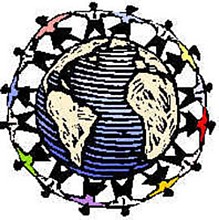Additional
Resources (Prep. for Hist 200WD, Winter 2011) (back
to top)
- 200WD is a 10-week graduate reading course designed to prepare students for a PhD examination field in World History, and to teach the World History survey. I taught it in 2011 (only once so far--UCSB world history faculty have been rotating through teaching it).
- Valuable Online Resources for Students of History, a short annotated list by guide to online schools.com
[Sept. 2020: 2014 web archive link, site archived 2014-2016]
- What Can You Do With a History Major? link added in 2020 at request of CourseAdvisor.com. It has some interesting statistics about History majors' degree levels, earnings, careers, etc.
Links
Books (English)
- Chris Harman, A People's History of the World: From the Stone Age to the New Millennium (Verso, 2008). (amazon $14) [UCI, UCSC only]
- Ross E. Dunn, The New World History: A Teacher's Companion (Bedford/St. Martin's, 1999). (amazon $22-$55)
- Tignor (et al), Worlds Together, Worlds Apart (3rd ed. 2010) (Norton ebook lite)
- Heidi Roupp, ed., Teaching World History in the Twenty-First Century: A Resource Book (Armonk, N.Y: M.E. Sharpe, 2010 [1st ed. 1997]). (H-Teach discussion, started 8/23/10)
Books (German)
- Michael Borgolte: Christen, Juden, Muselmanen. Die Erben der Antike
und der Aufstieg des Abendlandes 300 bis 1400 n. Chr. (Munich,
2006)
- Jürgen Osterhammel: Die Verwandlung der Welt: Eine Geschichte
des 19. Jahrhunderts (Munich, 2009), 1305
- Bärbel Kuhn / Holger Schmenk / Astrid Windus (eds.): Weltgeschichtliche
Perspektiven im Geschichtsunterricht (St. Ingbert: Röhrig
Universitätsverlag 2010), 132 pp. (May
2010 Sehepunkte review)(20Eur
at amazon.de)
- 4 scholarly essays & 8 classroom units from 2009 workshop
- Central question: What did peoples in the past know about
each other?
E.g. Crusaders and Muslims; European vs. colonial troops in WWI
- Has sources with detailed commentary, each on separate page for
easy copy use
|
